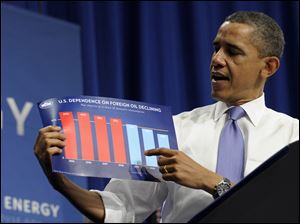
Obama demands Congress end oil, gas subsidies, as he visits NH to shore up support
3/1/2012
President Barack Obama holds up a chart as he speaks about his blueprint for an economy built to last with a focus on American energy, at Nashua Community College, in Nashua, N.H.
NASHUA, N.H. — President Barack Obama, turning his political sights on snowy New Hampshire, demanded that Congress eliminate oil and gas company subsidies that he called an outrageous government "giveaway." Though politically a long shot, the White House believes the idea resonates at a time of high gasoline prices.
"Let's put every single member of Congress on record: You can stand with oil companies or you can stand up for the American people," Obama said, reiterating an appeal he made last year as gas prices were rising.
The president also said GOP charges that his policies are driving up gas prices won't pass "a political bull-detector" test and pointed to a chart that showed decreasing U.S. dependence on foreign oil. His remarks came as retail gasoline prices rose Thursday to a national average of $3.74 per gallon.
Obama has repeatedly called for an end to about $4 billion in annual tax breaks and subsidies for oil and gas companies, government support that Obama has said is unwarranted at a time of burgeoning profits and rising domestic production.
"It's outrageous. It's inexcusable. I'm asking Congress: eliminate this oil industry giveaway right away," he told a crowd at Nashua Community College after touring the school's automotive lab.
It was Obama's latest and most direct appeal to Congress to act on the tax breaks, a move that is certain to get stiff Republican opposition and that failed before even when Democrats controlled both Houses of Congress. But an administration official said the White House expects Congress to soon take up a measure ending some subsidies. The official requested anonymity to avoid speaking publicly without authorization.
Last year, a report by the nonpartisan Congressional Research Service that was getting renewed attention on Thursday concluded that Obama's oil and gas proposals "may have the effect of decreasing exploration, development, and production, while increasing prices and increasing the nation's foreign oil dependence." It also said such an impact would likely be on "a small scale."
Criticized by Republicans for taking too much credit for increasing oil production at home, Obama made sure to credit both his administration and that of his predecessor, George W. Bush, without mentioning Bush by name. The move seemed intended on stripping away that line of criticism from his opposition.
Obama's insistence on a congressional vote on the oil and gas subsidies came a day after he and House and Senate leaders held a luncheon meeting at the White House that House Speaker John Boehner described as encouraging and hopeful.
But on Thursday, Republican presidential contenders and GOP leaders in Congress denounced Obama's appeal for ending subsidies and called on Obama to take further steps to expand oil production in the United States.
"If someone in the administration can show me that raising taxes on American energy production will lower gas prices and create jobs, then I will gladly discuss it. But since nobody can, and the president doesn't, this is merely an attempt to deflect from his failed policies," Senate Minority Leader Mitch McConnell said.
White House spokesman Jay Carney shot back that oil companies are making big profits and "it doesn't make sense for the taxpayer to cushion their already very robust bottom line."
Obama went further than he has in the past in describing how the global standoff with Iran is driving up the cost of gasoline.
"The biggest thing that's causing the price of oil to rise right now is instability in the Middle East — this time it's Iran," Obama said. "A lot of folks are nervous about what might happen there, so they are anticipating there might be a big disruption in terms of flow."
Obama has previously identified tension with Iran as a main reason for rising oil prices, but this time he ad-libbed the remark about how the prospect of a reduction in the supply of oil is making the markets nervous.
The United States and its partners are trying to deter Iran from building a nuclear weapon, including with an unprecedented European embargo on Iranian oil that takes effect this summer. Iran has responded to tightening economic sanctions and the possibility of an Israeli attack with threats to block oil shipments from the Persian Gulf.
On the presidential campaign trail, GOP front-runner Mitt Romney and former House Speaker Newt Gingrich also decried Obama's energy policies.
"He's going to talk about how he's responsible for the increasing production of oil in this country, oil and gas in this country," Romney said in Fargo, N.D. "Is he responsible for the increase? No, I didn't think so."
Gingrich, campaigning in Woodstock, Ga., called on Obama to fire Energy Secretary Steven Chu, approve a Canada-Texas pipeline and open more of the Gulf of Mexico and Alaska to oil drilling.
"He ran in 2008 on the slogan, 'Yes we can.' He's running this year on the slogan 'Why we couldn't,'" Gingrich said.
In choosing New Hampshire to deliver an energy message, Obama chose a state he easily carried in 2008. He and his surrogates have paid particular political attention to the state in recent months. It offers only four electoral votes in the November election, but Democrats have been eyeing New Hampshire warily following its sharp shift to the right in the 2010 midterm elections.
However, a poll conducted in New Hampshire in early February showed Obama beating Romney by 10 percentage points in a hypothetical matchup. Other GOP presidential candidates also trailed Obama in the WMUR Granite State poll. It gave Obama an 8-point advantage over Texas Rep. Ron Paul, who is a favorite in libertarian-leaning New Hampshire, and an advantage of more than 20 points over both Gingrich and Santorum.